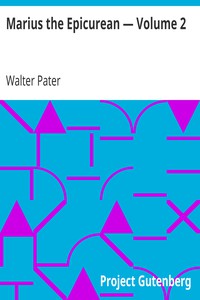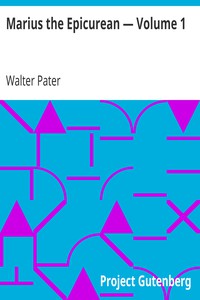Marius the Epicurean — Volume 2, Walter Pater [best romantic novels in english txt] 📗

- Author: Walter Pater
Book online «Marius the Epicurean — Volume 2, Walter Pater [best romantic novels in english txt] 📗». Author Walter Pater
In this peculiar and privileged hour, his bodily frame, as he could recognise, although just then, in the whole sum of its capacities, so entirely possessed by him—Nay! actually his very self—was yet determined by a far-reaching system of material forces external to it, a thousand combining currents from earth and sky. Its seemingly active powers of apprehension were, in fact, but susceptibilities to influence. The perfection of its capacity might be said to depend on its passive surrender, as of a leaf on the wind, to the motions of the great stream of physical energy without it. And might not the intellectual frame also, still more intimately himself as in truth it was, after the analogy of the bodily life, be a moment only, an impulse or series of impulses, a single process, in an intellectual or spiritual system external to it, diffused through all time and place—that great stream of spiritual energy, of which his own imperfect thoughts, yesterday or to-day, would be but the remote, and therefore imperfect pulsations? It was the hypothesis (boldest, though in reality the most conceivable of all hypotheses) which had dawned on the contemplations of the two opposed great masters of the old Greek thought, alike:—the “World of Ideas,” existent only because, and in so far as, they are known, as Plato conceived; the “creative, incorruptible, informing mind,” supposed by Aristotle, so sober-minded, yet as regards this matter left something of a mystic after all. Might not this entire material world, the very scene around him, the immemorial rocks, the firm marble, the olive-gardens, the falling water, be themselves but reflections in, or a creation of, that one indefectible mind, wherein he too became conscious, for an hour, a day, for so many years? Upon what other hypothesis could he so well understand the persistency of all these things for his own intermittent consciousness of them, for the intermittent consciousness of so many generations, fleeting away one after another? It was easier to conceive of the material fabric of things as but an element in a world of thought—as a thought in a mind, than of mind as an element, or accident, or passing condition in a world of matter, because mind was really nearer to himself: it was an explanation of what was less known by what was known better. The purely material world, that close, impassable prison-wall, seemed just then the unreal thing, to be actually dissolving away all around him: and he felt a quiet hope, a quiet joy dawning faintly, in the dawning of this doctrine upon him as a really credible opinion. It was like the break of day over some vast prospect with the “new city,” as it were some celestial New Rome, in the midst of it. That divine companion figured no longer as but an occasional wayfarer beside him; but rather as the unfailing “assistant,” without whose inspiration and concurrence he could not breathe or see, instrumenting his bodily senses, rounding, supporting his imperfect thoughts. How often had the thought of their brevity spoiled for him the most natural pleasures of life, confusing even his present sense of them by the suggestion of disease, of death, of a coming end, in everything! How had he longed, sometimes, that there were indeed one to whose boundless power of memory he could commit his own most fortunate moments, his admiration, his love, Ay! the very sorrows of which he could not bear quite to lose the sense:—one strong to retain them even though he forgot, in whose more vigorous consciousness they might subsist for ever, beyond that mere quickening of capacity which was all that remained of them in himself! “Oh! that they might live before Thee”—To-day at least, in the peculiar clearness of one privileged hour, he seemed to have apprehended that in which the experiences he valued most might find, one by one, an abiding-place. And again, the resultant sense of companionship, of a person beside him, evoked the faculty of conscience—of conscience, as of old and when he had been at his best, in the form, not of fear, nor of self-reproach even, but of a certain lively gratitude.
Himself—his sensations and ideas—never fell again precisely into focus as on that day, yet he was the richer by its experience. But for once only to have come under the power of that peculiar mood, to have felt the train of reflections which belong to it really forcible and conclusive, to have been led by them to a conclusion, to have apprehended the Great Ideal, so palpably that it defined personal gratitude and the sense of a friendly hand laid upon him amid the shadows of the world, left this one particular hour a marked point in life never to be forgotten. It gave him a definitely ascertained measure of his moral or intellectual need, of the demand his soul must make upon the powers, whatsoever they might be, which had brought him, as he was, into the world at all. And again, would he be faithful to himself, to his own habits of mind, his leading suppositions, if he did but remain just there? Must not all that remained of life be but a search for the equivalent of that Ideal, among so-called actual things—a gathering together of every trace or token of it, which his actual experience might present?
TWO CURIOUS HOUSES I. GUESTS
“Your old men shall dream dreams.”+
A nature like that of Marius, composed, in about equal parts, of instincts almost physical, and of slowly accumulated intellectual judgments, was perhaps even less susceptible than other men’s characters of essential change. And yet the experience of that fortunate hour, seeming to gather into one central act of vision all the deeper impressions his mind had ever received, did not leave him quite as he had been. For his mental view, at least, it changed measurably the world about him, of which he was still indeed a curious spectator, but which looked further off, was weaker in its hold, and, in a sense, less real to him than ever. It was as if he viewed it through a diminishing glass. And the permanency of this change he could note, some years later, when it happened that he was a guest at a feast, in which the various exciting elements of Roman life, its physical and intellectual accomplishments, its frivolity and far-fetched elegances, its strange, mystic essays after the unseen, were elaborately combined. The great Apuleius, the literary ideal of his boyhood, had arrived in Rome,—was now visiting Tusculum, at the house of their common friend, a certain aristocratic poet who loved every sort of superiorities; and Marius was favoured with an invitation to a supper given in his honour.
It was with a feeling of half-humorous concession to his own early boyish hero-worship, yet with some sense of superiority in himself, seeing his old curiosity grown now almost to indifference when on the point of satisfaction at last, and upon a juster estimate of its object, that he mounted to the little town on the hillside, the foot-ways of which were so many flights of easy-going steps gathered round a single great house under shadow of the “haunted” ruins of Cicero’s villa on the wooded heights. He found a touch of weirdness in the circumstance that in so romantic a place he had been bidden to meet the writer who was come to seem almost like one of the personages in his own fiction. As he turned now and then to gaze at the evening scene through the tall narrow openings of the street, up which the cattle were going home slowly from the pastures below, the Alban mountains, stretched between the great walls of the ancient houses, seemed close at hand—a screen of vaporous dun purple against the setting sun—with those waves of surpassing softness in the boundary lines which indicate volcanic formation. The coolness of the little brown market-place, for profit of which even the working-people, in long file through the olive-gardens, were leaving the plain for the night, was grateful, after the heats of Rome. Those wild country figures, clad in every kind of fantastic patchwork, stained by wind and weather fortunately enough for the eye, under that significant light inclined him to poetry. And it was a very delicate poetry of its kind that seemed to enfold him, as passing into the poet’s house he paused for a moment to glance back towards the heights above; whereupon, the numerous cascades of the precipitous garden of the villa, framed in the doorway of the hall, fell into a harmless picture, in its place among the pictures within, and scarcely more real than they—a landscape-piece, in which the power of water (plunging into what unseen depths!) done to the life, was pleasant, and without its natural terrors.
At the further end of this bland apartment, fragrant with the rare woods of the old inlaid panelling, the falling of aromatic oil from the ready-lighted lamps, the iris-root clinging to the dresses of the guests, as with odours from the altars of the gods, the supper-table was spread, in all the daintiness characteristic of the agreeable petit-maître, who entertained. He was already most carefully dressed, but, like Martial’s Stella, perhaps consciously, meant to change his attire once and again during the banquet; in the last instance, for an ancient vesture (object of much rivalry among the young men of fashion, at that great sale of the imperial wardrobes) a toga, of altogether lost hue and texture. He wore it with a grace which became the leader of a thrilling movement then on foot for the restoration of that disused garment, in which, laying aside the customary evening dress, all the visitors were requested to appear, setting off the delicate sinuosities and well-disposed “golden ways” of its folds, with harmoniously tinted flowers. The opulent sunset, blending pleasantly with artificial light, fell across the quiet ancestral effigies of old consular dignitaries, along the wide floor strewn with sawdust of sandal-wood, and lost itself in the heap of cool coronals, lying ready for the foreheads of the guests on a sideboard of old citron. The crystal vessels darkened with old wine, the hues of the early autumn fruit—mulberries, pomegranates, and grapes that had long been hanging under careful protection upon





Comments (0)